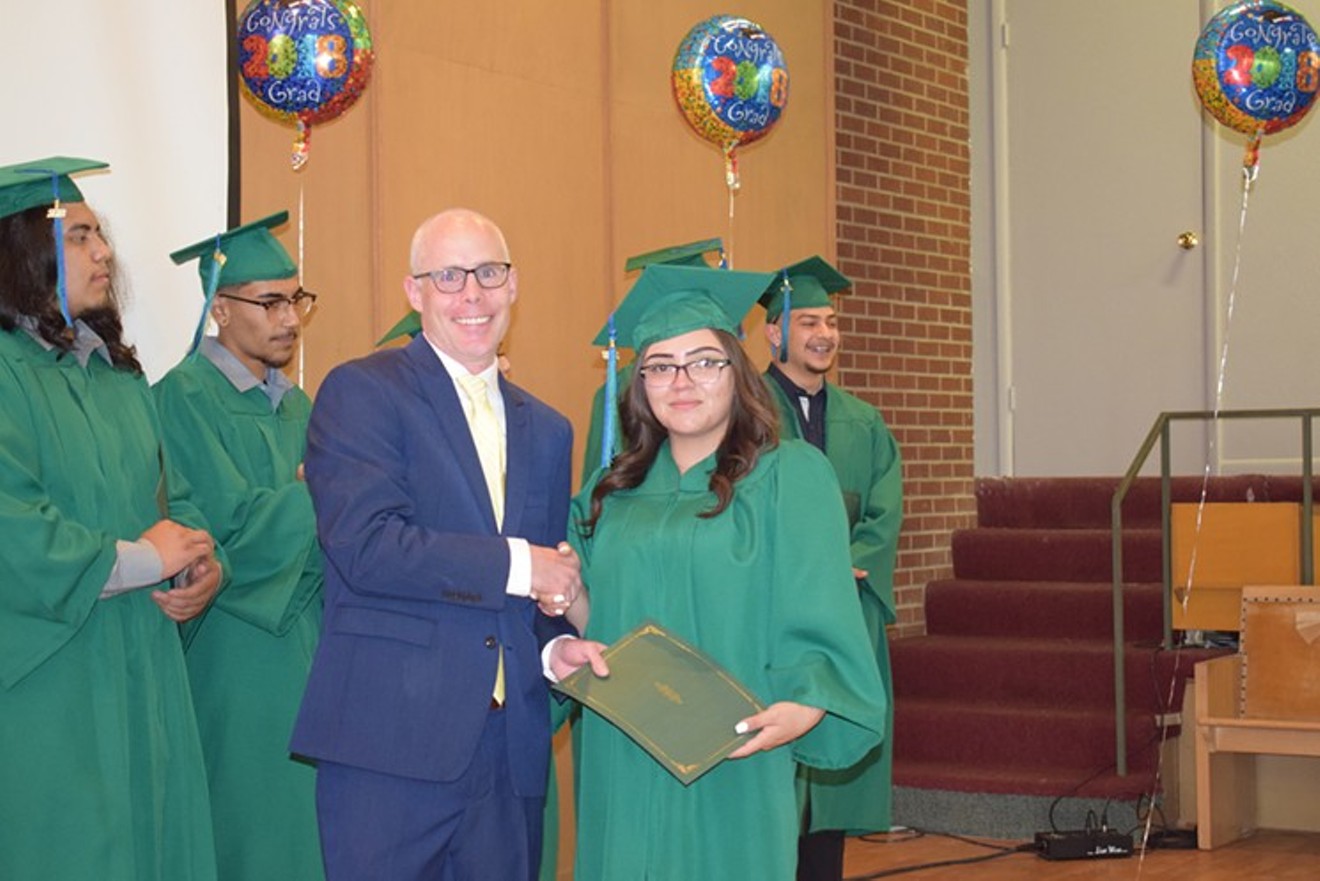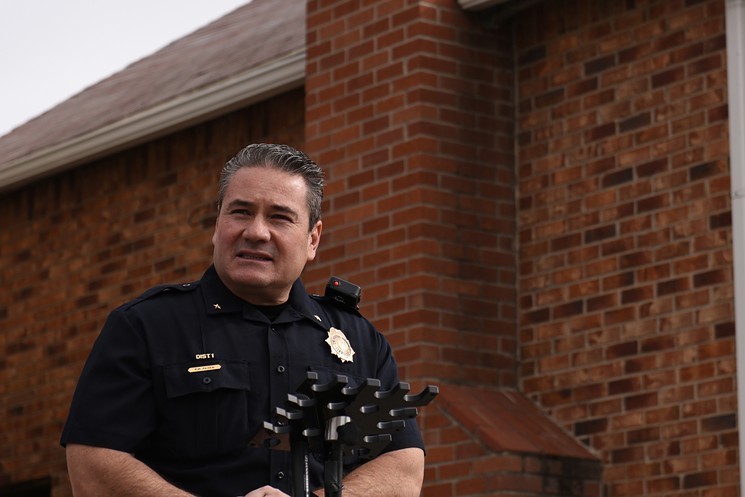But clouds from an April incident still hang over the RiseUp Community School, a charter that serves as a second (or third or fourth) chance for students who aren't suited to a traditional school setting. On April 24, the Denver Police Department stormed the downtown campus in pursuit of a student wanted for attempted first-degree murder — a student who, as it turned out, wasn't even on campus.
Teachers and administrators dispute many of the details in the report of what happened that day released by the DPD — released only after community outcry. Officers allege that they were led inside by school officials, which principal Lucas Ketzer denies. The DPD says that officers never drew weapons on teachers inside the building, though Ketzer insists that a gun was pulled on a staff member who used a back door to look for students. Officers pushed aside a teacher who was guarding her classroom and marched between desks, pulling hats off students and asking some to produce IDs. In all, police mistook three students for the suspect.
RiseUp staff and parents attended a heated Denver Pubic Schools board meeting in May during which DPS superintendent Tom Boasberg not only apologized, but insisted that the incident should never have happened. DPS and the DPD's Internal Affairs Bureau launched separate investigations into officer conduct that day, vowing to right any wrongs.
But five months later, RiseUp is still no closer to getting answers than it was the day after the search, and not for lack of trying on the school's part, Ketzer says.
"Why do I need to spend my time and energy when folks said they were going to support us, to advocate for our students, and try to bring to light what they acknowledged was something that shouldn't have happened?" he asks.
Ketzer has spent the past few months navigating the complicated bureaucracy that is the police disciplinary process.
He got a call over the summer notifying him that the Internal Affairs Bureau report into the April incident had been completed. The bureau, which investigates police officers, and the Office of the Independent Monitor, which oversees IAB investigations and conducts its own, concluded that the police department and staff at RiseUp should participate in a mediation that would include all of the officers that the bureau had identified as involved in the incident, along with any others identified by the school, as well as staff and students who were directly involved.
In laying out the stipulations, Steve Charbonneau, the mediator contracted by the City of Denver to oversee the discussion, instructed Ketzer to submit a public-information request to the bureau to receive a copy of the report. Otherwise, the IAB's report wouldn't be released until after the mediation had been completed. (Charbonneau later clarified to Westword that the report wouldn't be released in response to a public-information request until after the mediation was completed.)"It's not like we're ignoring them or don't have compassion for them."
tweet this
The logic behind the protocol didn't square with Ketzer, who says he thought that he and his staff should be able to review the report so that they knew all parties were walking into the mediation room with the same set of facts. In the meantime, Ketzer asked Charbonneau to meet with the entire RiseUp staff and field any questions they might have about the mediation.
"He described that the purpose of a mediation is to build empathy among parties and hear different perspectives," Ketzer says. "What I again told the mediator is, it's going to be hard for staff to engage in mediation with DPD if we're not operating off the same standard set of facts. The way that DPD had initially characterized what happened here omitted...[and] misrepresented and mis-characterized [facts]."
Building trust with police was critical to the staff at RiseUp, Ketzer wrote to Charbonneau in August. "And if we conduct the mediation, and when it starts we discover that the DPD disagrees with our presentation of the facts of this incident, it would be a devastating blow to any trust," he said. "We would much prefer to arrive at agreement, and to be able to provide a joint statement to the media, than to find ourselves at odds and without a pathway to agreement."
"Fair enough," Charbonneau replied. "I'll pass your request along to IA and OIM."
More back-and-forth between Charbonneau, the IAB and Ketzer ensued, with all parties standing firm in their resolve, until finally Charbonneau closed the case, meaning the chance to mediate was off the table — a fact Ketzer only learned through the course of Westword's reporting.
After Paul Pazen succeeded Robert White as police chief in July, he selected new commanders for the city's six police districts. The new District 6 commander, Aaron Sanchez, visited RiseUp in late August to meet Ketzer and get to know the staff. There was no mention of what had happened in April, however.
"Me, being the new commander of the district, we just went in and just said, there are two separate issues, and this issue is about me being the new commander of District 6 and trying to establish a relationship moving forward," Sanchez says.
Division Chief of Patrol Ron Thomas accompanied Sanchez on the visit. They engaged in friendly banter with students that day, he says, adding that he feels confident the students can distinguish between the new command and the officers from April.
"While I recognize that we're wearing the same uniform as the individuals they encountered back in April, I do think we can create some separation between that individual incident and just the police in general and still have a positive relationship," Thomas says.

RiseUp’s curriculum and schedule take into account the needs and challenges of its student population.
Courtesy of Lucas Ketzer
While much of the outside world might see the students as hopeless, staff at RiseUp see a population that has a different set of needs. “A lot of our students come from systems of power in which they’re seen as less than, and don’t necessarily have great perceptions of school,” Ketzer told us in June. “So we have to break down those perceptions and show them how they’re different. And that’s about building relationships.”
DPS Chief Legal and External Affairs Officer Terrance Carroll says that while the district isn't directly involved in the DPD's investigation, he has tried to support Ketzer by reaching out to the mayor's office to try to work around the city's mediation policy and allow the principal and his staff to see the report.
"It's not like we're ignoring them or don't have compassion for them," Carroll says. "We're doing the best we can to navigate a very complex bureaucracy and try to use whatever resources are in our hands to assist Lucas in interacting with the City and County of Denver and the police."
Carroll says he will "keep reaching out, making phone calls [to our] partners in the mayor's office and partners in DPD" to find out the status of the investigation. He isn't sure when the next phone call will be made, though. "As you know, DPS, much like the folks at RiseUp — we have a million things going on every day," he explains. "This still remains a priority for us to bring this to a resolution."
The results of the promised DPS investigation, however, have not been released, either; we've requested a status report from the school district.
Meanwhile, the DPD's Conduct Review Office, which makes police disciplinary recommendations, has the IAB's investigation report; any disciplinary recommendations regarding the RiseUp incident will be sent to Pazen for consideration.
Though mediation is no longer an option, Charbonneau says he still believes both sides should sit down with each other at some point and hash out what happened.
"The file's still open on my laptop," he says. "I haven't archived it. At some point, a lot of teachers, a lot of cops, need to get this figured out."













